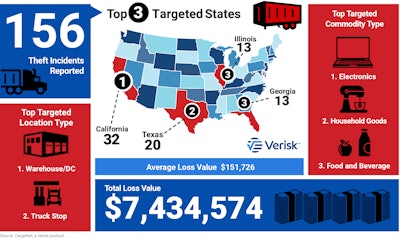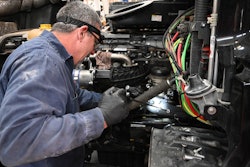Trucking news and briefs for Thursday, Aug. 31, 2023:
Cargo theft expected to increase over holiday weekend
 During the last five Labor Day weekends -- considered the Thursday before through the Wednesday after the holiday -- CargoNet has recorded 156 theft incidents worth almost $7.5 million.CargoNet
During the last five Labor Day weekends -- considered the Thursday before through the Wednesday after the holiday -- CargoNet has recorded 156 theft incidents worth almost $7.5 million.CargoNet
Last week, theft reports to CargoNet reached their second-highest levels of the year. All supply chain professionals should be concerned with theft risk this upcoming Labor Day holiday. Starting now, the firm emphasized.
In order to mitigate risk, CargoNet examined theft trends around the previous five Labor Day holidays. In total, during it recorded 156 events with an average cargo value of $151,726 per event. Theft was highest in 2022, when CargoNet recorded 44 events. In previous years, cargo thieves preferred to steal valuable shipments of televisions, computers, and major appliances.
Thefts were most common near major supply chain hubs in Southern California, Dallas-Fort Worth, Chicago, Memphis and Atlanta. There were no fictitious pickups reported in this analysis period, but these kinds of thefts are the main threat professionals should look out for this year.

[Related: Transfix QR codes on rate cons aimed to guard against cargo theft, fraud]
CargoNet is warning of increased targeting of shipments of building materials such as shingles, lumber and power tools in response to extreme weather events in the Southeast.
Shipment misdirection schemes, a kind of fictitious pickup, remain the most pervasive threat to domestic, over-the-road freight transportation this upcoming holiday. CargoNet has recorded more than 600 shipment misdirection attacks or attempts since November 2022.
In these schemes, attackers impersonate a motor carrier to gain authorization to transport a shipment and then hire a motor carrier to deliver the shipment to a location they have access to so they can steal the shipment. Attackers often impersonate two or three different companies to disguise their identities and deceive their victims.
These attacks target a wide variety of goods from every state in the continental United States, but attackers have shown a preference for stealing truckload shipments of solar panels, energy drinks, alcoholic beverages, motor oil, and consumer electronics, CargoNet said.
Attacks can be mitigated with enhanced security protocols. For in-transit loads, the firm suggests:
- Make sure that both security managers and drivers have accurate license plate, VIN, and descriptive information for tractors, trailers, containers, and container chassis. Police agencies will need this information to open an investigation in the event of an incident. Drivers should keep this information on them so they can quickly reference it if their truck is stolen.
- Secure all trailers (loaded and unloaded) with high-security ISO 17712- compliant barrier seals in combination with hardened padlocks. Use king pin locks for unattached trailers.
- Secure all tractors with high-security locking devices, such as air-cuff and steering column locks.
- Remind drivers to arrive at point of pickup well-rested, showered and fed and with a full tank of fuel.
- Avoid having loaded trailers sit unattended when employees are not present.
[Related: Double-brokering scams that can result in theft of more than just money]
OOIDA preemptively voices opposition to increased truck weights
In anticipation of potential U.S. House consideration of legislative packages related to appropriations, agriculture (the Farm Bill), and the supply chain, the Owner-Operator Independent Drivers Association penned a letter to House offices in opposition to legislation to increase truck weight limits.
OOIDA said it is opposed specifically to two previously-introduced bills -- H.R. 3372, which would establish a five-year pilot program to allow heavier trucks, and the CARS Act, which would allow car-haulers to run at heavier weights to accommodate for electric vehicles.
“Allowing for increased truck weights generally, as H.R. 3372 would do, benefits only a handful of large or specialized motor carriers while putting the rest of the industry, especially small businesses, at a disadvantage,” said OOIDA President Todd Spencer. “Proponents of weight increases portray these new limits as completely optional and maintain that carriers won’t have to haul at these weights if they don’t want to do so.”
Spencer noted, however, that “inevitably these weights become the new standard as businesses and shippers seek out carriers that offer the increased capacity.”
OOIDA estimates a conservative cost for a small fleet to upgrade an axle configuration by adding a third rear axle to haul at 91,000 pounds is $10,500 per truck.
Spencer said that the CARS Act “would give a handout to the EV industry at the expense of the rest of the trucking industry by allowing auto haulers to operate at increased weights to accommodate heavier EVs,” adding that it would “allow the EV industry to impose greater costs to infrastructure through increased wear and tear, at no cost to the EV industry itself.”
OOIDA added in the letter that it believes truck weight increases shouldn’t be used to address any perceived “driver shortage.”
“Contrary to what is repeated constantly, there is no shortage of drivers or CDL-holders,” Spencer said. “The notion of a driver shortage is not supported by facts, data, or reputable research. Instead, there is a shortage of decent pay and satisfactory working conditions for drivers that generates exceedingly high levels of turnover within the industry and ultimately forces many truckers away.”
[Related: Werner CEO shocked by small-fleet resiliency]
FMCSA names new Chief Safety Officer
The U.S. Department of Transportation on Aug. 30 announced Sue Lawless as the new Assistant Administrator and Chief Safety Officer for the Federal Motor Carrier Safety Administration. Lawless will officially assume the position on Sept. 10.
The position was previously held by Jack Van Steenburg, who retired earlier this year. It has been held most recently by Ken Riddle as the Acting Executive Administrator and Chief Safety Officer.
In this role, Lawless will serve to promote the agency’s safety mission; collaborate with federal, state, and local governments; and provide direction to all national commercial vehicle safety programs.
“We are extremely fortunate to have Sue in this position at FMCSA,” said Robin Hutcheson, FMCSA Administrator. “Her experience in the industry and her years of service at FMCSA will ensure the agency is well-positioned to continue its safety mission. Sue is a smart, savvy, steadfast strategist who can hit the ground running on FMCSA’s priorities, and I look forward to working with her in this role.”
Prior to her appointment, Lawless served as the Director of FMCSA’s Motor Carrier, Driver, and Vehicle Standards Division. She first joined FMCSA in 2001, but later transitioned to the private sector where she was a partner in a law firm and represented motor carriers, motor carrier drivers, and various transportation businesses. Lawless rejoined FMCSA in 2010.
She now brings more than 20 years of experience from the private and federal motor carrier safety industry to her new role, having engaged with nearly every FMCSA program as a trial attorney, Assistant Chief Counsel, Division Chief, and Director within the Office of Policy.










